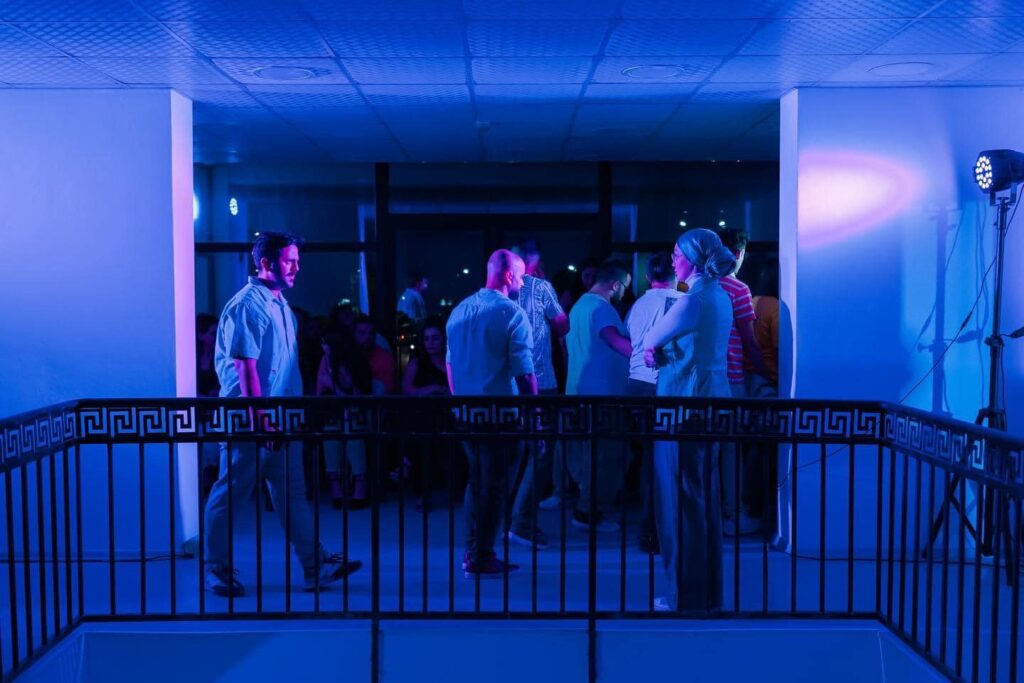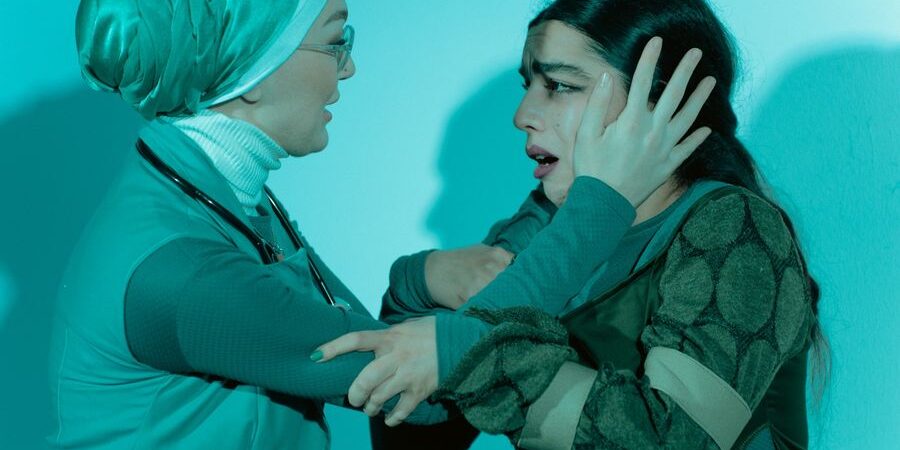Artpolis, premiere 20th December 2022
I’m not sure where Emma thought she was going when she tried to open the door, as the public was waiting outside for the performance to begin, but she didn’t have the key. Someone had to come and open the door to the medical facility for her and let her in. We follow Emma inside, like Alice following the White Rabbit.
Sober, directed by Butrint Pasha is based on Duncan Macmillan’s 2016 play People, Places and Things. Emma (Zhaneta Xhemajli), the protagonist, is an actress playing the role Nina in Chekhov’s classic The Seagull. After auditioning, while drugged to the eyeballs, Emma goes into a rehab center asking for help with her addiction. The performance takes place inside a real dispensary, which helps immerse us in the play.
Produced by cultural NGO Artpolis, this is a strikingly emotional, and at times very funny play enhanced by the unusual setting of the dispensary. This is a smart choice by director Pasha, it makes the piece feel more atmospheric and more intimate; at times, it almost comes to feel like a therapy session for the audience too.
The play is performed in four different spaces across two floors within the same building. After each scene, we are led by the actors to the next room. These transitions are smooth and help to keep the performance exciting and intriguing; each scene deals with Emma’s and the other residents’ stages of rehab and their progress along the way.
It is only in the third space that the audience gets to learn the personal stories of the five characters that are being treated in the rehabilitation centre. Their confessions are like live memoirs, describing their painful and often chaotic lives.
It takes some time before Emma wants to engage with the group and reveal her identity to them. For a long while, the audience doesn’t know her real name, nor her story.

Sober – Artpolis
The group inside the rehab centre help each member heal and redeem themselves, but to do this they must accept the present and be real with themselves. In order to heal, they have to be able to pronounce the most-loathed part of identity: “I’m Mark and I’m an alcoholic”, it is easy for some to say it, less so far others.
Addiction made Mark sell his nephew’s bicycle and use the money for drugs. Drugs have cut these people off from their own creativity and imagination. Each has done wrong in the society in which they live, but they have also been hurt by society. Some were born in difficult circumstances, others made circumstances difficult for themselves.
Pasha’s production further contextualizes the play within the situation in Kosovo, such as the political climate and the economic/financial problems, in the scenes in which Emma voices her dissatisfaction with the society and the conditions in which she lives, in her conversations with the therapist.
The performances are phenomenal, each actor personifying their character in a vivid way. Emma is beautifully played by Xhemajli, in the role of a woman who has been under the influences of substances for a long time and has joined the recovery program primarily to get the certification she needs to return to her acting work. Emma can only be true to herself when she’s performing. She has left her true identity behind. Xhemajli captures her struggle to find her real self.
When Emma finally opens up to the group, we are able to see her wounds. Her life has been shattered by the death of her brother and she has created havoc in her own life by not caring anymore about herself, stealing her mother to fuel her addiction.
Xhemajli gracefully portrays the pain the character has suffered; she is so real in front of the audience, conveying her character’s intelligence, anxiety and sense of existential dread. Emma’s philosophy is that nothing is certain, existence is not built on a strong foundation. She cannot function normally in an uncertain world. She seems to have forgotten the rest of us live in this same uncertain world too.
The beauty of Macmillan’s play is the way it shows us how it is possible to redeem ourselves through acceptance of one’s own history and that one can always write a better history as long as one is alive. Religion is also a part of the healing process in the rehab centre. The doctor and therapist played by Kaltrine Zeneli, gives the Bible to her patients to read.
Her patients’ convalescence is a tough process but an attainable one. The session of activities that are done in the rehab centre show how healing can be achieved in groups. By encouraging each other to tell personal stories, and by being able to accept who you are, and who you were, one can move forward. We also learn that the staff at the rehab centre were also once addicts, but they have chosen a sober life, one of dignified service to themselves and others.
Emma gets reunited with her mom and goes to live with her, promising once again that she will try her best to stay sober; by the end, she seems a bit closer to her truth.
Credits:
Based on the play People, Places & Things, by Duncan Macmillan// Directed by Butrint Pasha// Scenic and costume design: Alma Krasniqi// Lighting design by Mursel Bekteshi// Translation by Brezar Xërxa// Composition by Adhurim Grezda//Choreography by Robert Nuha//Technical assistance: Elira Lluka//Produced by Artpolis, Center for Art and Community.
Cast: Zhaneta Xhemajli, Shpetim Selmani, Kumrije Hoxha, Kaltrinë Zeneli, Blerta Gubetini, Edlir Gashi, Blend Sadiku, Zana Berisha, Altin Vraniqi
For further information, visit: artpolis-ks.com
Further reading: review of People, Places and Things at Mladinsko Theatre, Ljubljana
Florida is a lover of words, and of art in all its forms: fiction, poetry and drama.








